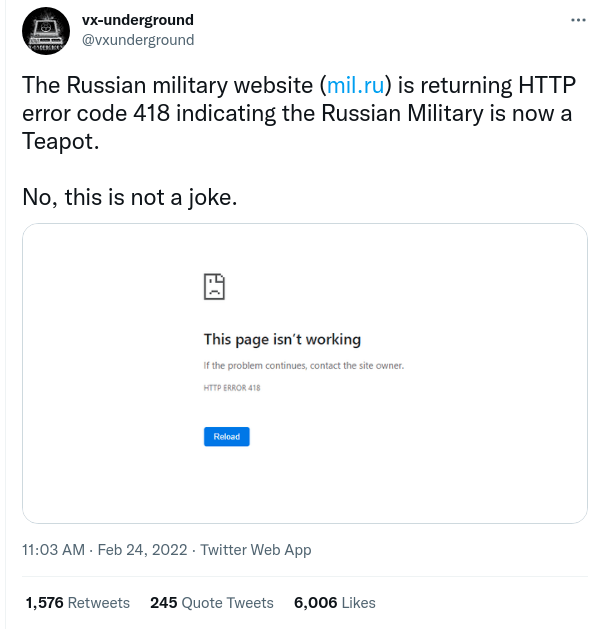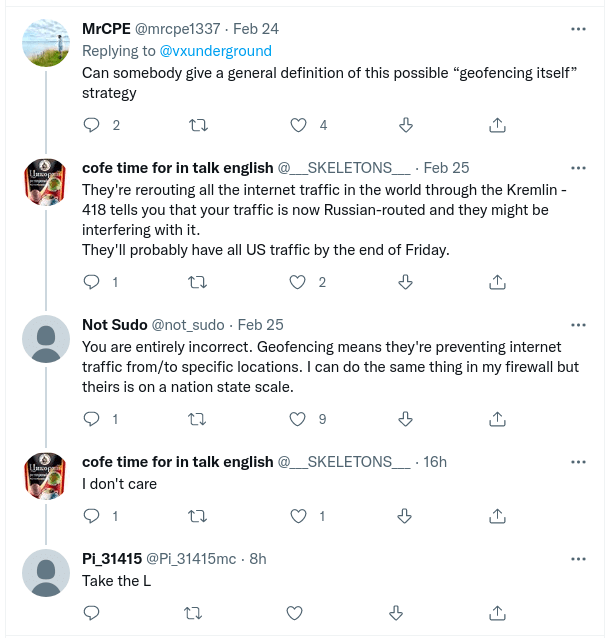Disinformation is Free

Checking Twitter lately has been all about Ukraine and Russia and for good reason due to an ongoing invasion. I noticed a tweet that caught my eye as someone in the technology field.

This tweet garnered a good deal of traffic with about ~1,500 retweets and 6,000 likes so a lot of folks appreciated it. This tweet without explicitly saying it was interpreted by the masses that some entity "hacked" Russia's military and took down their website and returned a joke HTTP status code of 418 that stands for "I'm a Teapot".

40 minutes later the tweet author sent an updated tweet that draws a further conclusion that this 418 is only returned in select geographic areas in the world. So basically we now understand that this filter (with a joke return code) is simply blocking access to Russian Military websites to the non-Russian world.
Though, the initial basically disinformation tweet got 1,576 retweets versus the correction at 233. The ripple of this is unreal and sadly most don't seek to understand the truth behind something and instead just trust the first thing that was spread.
With a bit of research though you can discover this happened in December of 2021 nearly 70 days ago! So yes, Russia is blocking access to its military site to non-Russia IPs, but it happened in December of 2021. So we can dismiss all these crazy claims that a worldwide "hack" took place recently.
I will have to shout-out a clearly obvious troll.

All of this together got me wondering again about a common experience where a link is given to some news site and I hit a paywall.
Lets say there is a worldwide topic going on with something, like happens nearly monthly.

If the article that speaks the truth from on the ground research is behind a paywall - where do folks get knowledge? They find free news which is available everywhere, but what quality is the free news?
I don't think Wall Street Journal can really make every article free, because its been proven the era of advertising and harvesting information from readers is more and more difficult in 2022. This closes a loophole of money making and one of the remaining options to remain positive is to charge for your content.
Though, how do we combat obviously false information that spreads the Internet when information we hope is truthful from reputable sources is commonly left to those who can afford it.
This is a tough question, but I don't think censoring everything is the answer. Since who decides what is true or not? Not to mention the mantra of the United Sates is free speech. I just find it incredibly frustrating that you continue to find false information that spreads faster and further than the alternative, hopefully truthful, paid news sources.
This also reminded me of a conversation I had a bit ago. While watching a news report about the Missouri governor claiming viewing the HTML of a website was hacking - a friend wanted to ask me what I thought about that.
Clearly I knew that viewing HTML cannot be claimed as hacking in any regard, but what I found scary about that is I knew enough about that specific topic to debate the claim. However, given a topic I'm not versed in that I hear in the news - who knows if I'm being lead astray?
I either have to cross check everything I hear in the news - which takes time and energy or I have to find a news source that I can trust. The complete opposite of that is just ignoring all news which then sadly positions me into a person that has no insights into current affairs.
There is no easy way to solve any of this, so instead I'll just blog about it.
